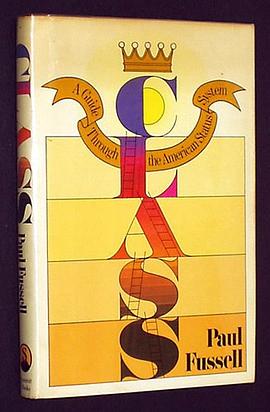
具体描述
Book Description
In Class Paul Fussell explodes the sacred American myth of social equality with eagle-eyed irreverence and iconoclastic wit. This bestselling, superbly researched, exquisitely observed guide to the signs, symbols, and customs of the American class system is always outrageously on the mark as Fussell shows us how our status is revealed by everything we do, say, and own. He describes the houses, objects, artifacts, speech, clothing styles, and intellectual proclivities of American classes from the top to the bottom and everybody -- you'll surely recognize yourself -- in between. Class is guaranteed to amuse and infuriate, whether your class is so high it's out of sight (literally) or you are, alas, a sinking victim of prole drift.
Chapter 1
A Touchy Subject
Although most Americans sense that they live within an extremely complicated system of social classes and suspect that much of what is thought and done here is prompted by considerations of status, the subject has remained murky. And always touchy. You can outrage people today simply by mentioning social class, very much the way, sipping tea among the aspidistras a century ago, you could silence a party by adverting too openly to sex. When, recently, asked what I am writing, I have answered, "A book about social class in America," people tend first to straighten their ties and sneak a glance at their cuffs to see how far fraying has advanced there. Then, a few minutes later, they silently get up and walk away. It is not just that I am feared as a class spy. It is as if I had said, "I am working on a book urging the beating to death of baby whales using the dead bodies of baby seals." Since I have been writing this book I have experienced many times the awful truth of R. H. Tawney's perception, in his book Equality (1931): "The word 'class' is fraught with unpleasing associations, so that to linger upon it is apt to be interpreted as the symptom of a perverted mind and a jaundiced spirit."
Especially in America, where the idea of class is notably embarrassing. In his book Inequality in an Age of Decline (1980), the sociologist Paul Blumberg goes so far as to call it "America's forbidden thought." Indeed, people often blow their tops if the subject is even broached. One woman, asked by a couple of interviewers if she thought there were social classes in this country, answered: "It's the dirtiest thing I've ever heard of!" And a man, asked the same question, got so angry that he blurted out, "Social class should be exterminated!"
Actually, you reveal a great deal about your social class by the amount of annoyance or fury you feel when the subject is brought up. A tendency to get very anxious suggests that you are middle-class and nervous about slipping down a rung or two. On the other hand, upper-class people love the topic to come up: the more attention paid to the matter the better off they seem to be. Proletarians generally don't mind discussions of the subject because they know they can do little to alter their class identity. Thus the whole class matter is likely to seem like a joke to them — the upper classes fatuous in their empty aristocratic pretentiousness, the middles loathsome in their anxious gentility. It is the middle class that is highly class-sensitive, and sometimes class-scared to death. A representative of that class left his mark on a library copy of Russell Lynes's The Tastemakers (1954). Next to a passage patronizing the insecure decorating taste of the middle class and satirically contrasting its artistic behavior to that of some more sophisticated classes, this offended reader scrawled, in large capitals, "BULL SHIT!" A hopelessly middle-class man (not a woman, surely?) if I ever saw one.
If you reveal your class by your outrage at the very topic, you reveal it also by the way you define the thing that's outraging you. At the bottom, people tend to believe that class is defined by the amount of money you have. In the middle, people grant that money has something to do with it, but think education and the kind of work you do almost equally important. Nearer the top, people perceive that taste, values, ideas, style, and behavior are indispensable criteria of class, regardless of money or occupation or education. One woman interviewed by Studs Terkel for Division Street: America (1967) clearly revealed her class as middle both by her uneasiness about the subject's being introduced and by her instinctive recourse to occupation as the essential class criterion. "We have right on this street almost every class," she said. "But I shouldn't say class," she went on, "because we don't live in a nation of classes." Then, the occupational criterion: "But we have janitors living on the street, we have doctors, we have businessmen, CPAs."
Being told that there are no social classes in the place where the interviewee lives is an old experience for sociologists. "'We don't have classes in our town' almost invariably is the first remark recorded by the investigator," reports Leonard Reissman, author of Class in American Life (1959). "Once that has been uttered and is out of the way, the class divisions in the town can be recorded with what seems to be an amazing degree of agreement among the good citizens of the community." The novelist John O'Hara made a whole career out of probing into this touchy subject, to which he was astonishingly sensitive. While still a boy, he was noticing that in the Pennsylvania town where he grew up, "older people do not treat others as equals."
Class distinctions in America are so complicated and subtle that foreign visitors often miss the nuances and sometimes even the existence of a class structure. So powerful is "the fable of equality," as Frances Trollope called it whenshe toured America in 1832, so embarrassed is the government to confront the subject — in the thousands of measurements pouring from its bureaus, social class is not officially recognized — that it's easy for visitors not to notice the way the class system works. A case in point is the experience of Walter Allen, the British novelist and literary critic. Before he came over here to teach at a college in the 1950s, he imagined that "class scarcely existed in America, except, perhaps, as divisions between ethnic groups or successive waves of immigrants." But living awhile in Grand Rapids opened his eyes: there he learned of the snob power of New England and the pliability of the locals to the long-wielded moral and cultural authority of old families.
Some Americans viewed with satisfaction the failure of the 1970s TV series Beacon Hill, a drama of high society modeled on the British Upstairs, Downstairs, comforting themselves with the belief that this venture came to grief because there is noclass system here to sustain interest in it. But they were mistaken. Beacon Hill failed to engage American viewers because it focused on perhaps the least interesting place in the indigenous class structure, the quasi-aristocratic upper class. Such a dramatization might have done better if it had dealt with places where everyone recognizes interesting class collisions occur — the place where the upper-middle class meets the middle and resists its attempted incursions upward, or where the middle class does the same to the classes just below it.
If foreigners often fall for the official propaganda of social equality, the locals tend to know what's what, even if they feel some uneasiness talking about it. When the acute black from the South asserts of an ambitious friend that "Joe can't class with the big folks," we feel in the presence of someone who's attended to actuality. Like the carpenter who says: "I hate to say there are classes, but it's just that people are more comfortable with people of like backgrounds." His grouping of people by "like backgrounds," scientifically uncertain as it may be, is nearly as good a way as any to specify what it is that distinguishes one class from another. If you feel no need to explicate your allusions or in any way explain what you mean, you are probably talking with someone in your class. And that's true whether you're discussing the Rams and the Forty-Niners, RVs, the House (i.e., Christ Church, Oxford), Mama Leone's, the Big Board, "the Vineyard," "Baja," or the Porcellian.
In this book I am going to deal with some of the visible and audible signs of social class, but I will be sticking largely with those that reflect choice. That means that I will not be considering matters of race, or, except now and then, religion or politics. Race is visible, but it is not chosen. Religion and politics, while usually chosen, don't show, except for the occasional front-yard shrine or car bumper sticker. When you look at a person you don't see "Roman Catholic" or "liberal": you see "hand-painted necktie" or "crappy polyester shirt"; you hear parameters or in regards to. In attempting to make sense of indicators like these, I have been guided by perception and feel rather than by any method that could be deemed "scientific," believing with Arthur Marwick, author of Class: Image and Reality (1980), that "class...is too serious a subject to leave to the social scientists."
It should be a serious subject in America especially, because here we lack a convenient system of inherited titles, ranks, and honors, and each generation has to define the hierarchies all over again. The society changes faster than any other on earth, and the American, almost uniquely, can be puzzled about where, in the society, he stands. The things that conferred class in the 1930s — white linen golf knickers, chrome cocktail shakers, vests with white piping — are, to put it mildly, unlikely to do so today. Belonging to a rapidly changing rather than a traditional society, Americans find Knowing Where You Stand harder than do most Europeans. And a yet more pressing matter, Making It, assumes crucial importance here. "How'm I doin'?" Mayor Koch of New York used to bellow, and most of his audience sensed that he was, appropriately, asking the representative American question.
It seems no accident that, as the British philosopher Anthony Quinton says, "The book of etiquette in its modern form...is largely an American product, the great names being Emily Post...and Amy Vanderbilt." The reason is that the United States is preeminently the venue of newcomers, with a special need to place themselves advantageously and to get on briskly. "Some newcomers," says Quinton, "are geographical, that is, immigrants; others are economic, the newly rich; others again chronological, the young." All are faced with the problem inseparable from the operations of a mass society, earning respect. The comic Rodney Dangerfield, complaining that he don't get none, belongs to the same national species as that studied by John Adams, who says, as early as 1805: "The rewards...in this life are esteem and admiration of others — the punishments are neglect and contempt....The desire of the esteem of others is as real a want of nature as hunger — and the neglect and contempt of the world as severe a pain as the gout or stone...." About the same time the Irish poet Thomas Moore, sensing the special predicament Americans were inviting with their egalitarian Constitution, described the citizens of Washington, D.C., as creatures
Born to be slaves, and struggling to be lords.
Thirty years later, in Democracy in America, Alexis de Tocqueville put his finger precisely on the special problem of class aspiration here. "Nowhere," he wrote, "do citizens appear so insignificant as in a democratic nation." Nowhere, consequently, is there more strenuous effort to achieve — earn would probably not be the right word — significance. And still later in the nineteenth century, Walt Whitman, in Democratic Vistas (1871), perceived that in the United States, where the form of government promotes a condition (or at least an illusion) of uniformity among the citizens, one of the unique anxieties is going to be the constant struggle for individual self-respect based upon social approval. That is, where everybody is somebody, nobody is anybody. In a recent Louis Harris poll, "respect from others" is what 76 percent of respondents said they wanted most. Addressing prospective purchasers of a coffee table, an ad writer recently spread before them this most enticing American vision: "Create a rich, warm, sensual allusion to your own good taste that will demand respect and consideration in every setting you care to imagine."
The special hazards attending the class situation in America, where movement appears so fluid and where the prizes seem available to anyone who's lucky, are disappointment, and, following close on that, envy. Because the myth conveys the impression that you can readily earn your way upward, disillusion and bitterness are particularly strong when you find yourself trapped in a class system you've been half persuaded isn't important. When in early middle life some people discover that certain limits have been placed on their capacity to ascend socially by such apparent irrelevancies as heredity, early environment, and the social class of their immediate forebears, they go into something like despair, which, if generally secret, is no less destructive.
De Tocqueville perceived the psychic dangers. "In democratic times," he granted, "enjoyments are more intense than in the ages of aristocracy, and the number of those who partake in them is vastly larger." But, he added, in egalitarian atmospheres "man's hopes and desires are oftener blasted, the soul is more stricken and perturbed, and care itself more keen."
And after blasted hopes, envy. The force of sheer class envy behind vile and even criminal behavior in this country, the result in part of disillusion over the official myth of classlessness, should never be underestimated. The person who, parking his attractive car in a large city, has returned to find his windows smashed and his radio aerial snapped off will understand what I mean. Speaking in West Virginia in 1950, Senator Joseph R. McCarthy used language that leaves little doubt about what he was really getting at — not so much "Communism" as the envied upper-middle and upper classes. "It has not been the less fortunate or members of minority groups who have been selling this nation out," he said, "but rather those who have had all the benefits..., the finest homes, the finest college education...." Pushed far enough, class envy issues in revenge egalitarianism, which the humorist Roger Price, in The Great Roob Revolution (1970), distinguishes from "democracy" thus: "Democracy demands that all of its citizens begin the race even. Egalitarianism insists that they all finish even." Then we get the situation satirized in L. P. Hartley's novelFacial Justice (1960), about "the prejudice against good looks" in a future society somewhat like ours. There, inequalities of appearance are redressed by government plastic surgeons, but the scalpel isn't used to make everyone beautiful — it's used to make everyone plain.
Despite our public embrace of political and judicial equality, in individual perception and understanding — much of which we refrain from publicizing — we arrange things vertically and insist on crucial differences in value. Regardless of what we say about equality, I think everyone at some point comes to feel like the Oscar Wilde who said, "The brotherhood of man is not a mere poet's dream: it is a most depressing and humiliating reality." It's as if in our heart of hearts we don't want agglomerations but distinctions. Analysis and separation we find interesting, synthesis boring.
Although it is disinclined to designate a hierarchy of social classes, the federal government seems to admit that if in law we are all equal, in virtually all other ways we are not. Thus the eighteen grades into which it divides its civil-service employees, from grade 1 at the bottom (messenger, etc.) up through 2 (mail clerk), 5 (secretary), 9 (chemist), to 14 (legal administrator), and finally 16, 17, and 18 (high-level administrators). In the construction business there's a social hierarchy of jobs, with "dirt work," or mere excavation, at the bottom; the making of sewers, roads, and tunnels in the middle; and work on buildings (the taller, the higher) at the top. Those who sell "executive desks" and related office furniture know that they and their clients agree on a rigid "class" hierarchy. Desks made of oak are at the bottom, and those of walnut are next. Then, moving up, mahogany is, if you like, "upper-middle class," until we arrive, finally, at the apex: teak. In the army, at ladies' social/functions, pouring the coffee is the prerogative of the senior officer's wife because, as the ladies all know, coffee outranks tea.
There seems no place where hierarchical status-orderings aren't discoverable. Take musical instruments. In a symphony orchestra the customary ranking of sections recognizes the difficulty and degree of subtlety of various kinds of instruments: strings are on top, woodwinds just below, then brass, and, at the bottom, percussion. On the difficulty scale, the accordion is near the bottom, violin near the top. Another way of assigning something like "social class" to instruments is to consider the prestige of the group in which the instrument is customarily played. As the composer Edward T. Cone says, "If you play a violin, you can play in a string quartet or symphony orchestra, but not in a jazz band and certainly not in a marching band. Among woodwinds, therefore, flute, and oboe, which are primarily symphonic instruments, are 'better' than the clarinet, which can be symphonic, jazz, or band. Among brasses, the French horn ranks highest because it hasn't customarily been used in jazz. Among percussionists, tympani is high for the same reason." And (except for the bassoon) the lower the notes an instrument is designed to produce, in general the lower its class, bass instruments being generally easier to play. Thus a sousaphone is lower than a trumpet, a bass viol lower than a viola, etc. If you hear "My boy's taking lessons on the trombone," your smile will be a little harder to control than if you hear "My boy's taking lessons on the flute." On the other hand, to hear "My boy's taking lessons on the viola da gamba" is to receive a powerful signal of class, the kind attaching to antiquarianism and museum, gallery, or "educational" work. Guitars (except when played in "classical" — that is, archaic — style) are low by nature, and that is why they were so often employed as tools of intentional class degradation by young people in the 1960s and '70s. The guitar was the perfect instrument for the purpose of signaling these young people's flight from the upper-middle and middle classes, associated as it is with Gypsies, cowhands, and other personnel without inherited or often even earned money and without fixed residence.
The former Socialist and editor of the Partisan Review William Barrett, looking back thirty years, concludes that "the Classless Society looks more and more like a Utopian illusion. The socialist countries develop a class structure of their own," although there, he points out, the classes are very largely based on bureaucratic toadying. "Since we are bound...to have classes in any case, why not have them in the more organic, heterogeneous and variegated fashion" indigenous to the West? And since we have them, why not know as much as we can about them? The subject may be touchy, but it need not be murky forever.
Copyright © 1983 by Paul Fussell
Product Details
ISBN:
9780671792251
Subtitle:
A Guide Through the American Status System
Author:
Fussell, Paul
Author:
Fussell, Paul
Publisher:
Touchstone Books
Location:
New York :
Subject:
Sociology
Subject:
Social conditions
Subject:
Sociology, anthropology and archaeology
Subject:
Sociology - General
Subject:
Social status -- United States.
Subject:
General
Subject:
Poverty
Subject:
Social status
Subject:
Social classes
Subject:
General Social Science
Copyright:
1992
Edition Number:
1st Touchstone ed.
Edition Description:
B102
Publication Date:
October 1992
Binding:
Paperback
Language:
English
Illustrations:
Yes
Pages:
208
Dimensions:
846x554x57 48
作者简介
Paul Fussell, critic, essayist, and cultural commentator, has recently won the H. L. Mencken Award of the Free Press Association. Among his books are The Great War and Modem Memory, which in 1976 won both the National Book Critics Circle Award and the National Book Award; Abroad: British Literary Traveling Between the Wars; Wartime: Understanding and Behavior in the Second World War; and, most recently, BAD or, The Dumbing of America. His essays have been collected in The Boy Scout Handbook and Other Observations and Thank God for the Atom Bomb and Other Essays. He lives in Philadelphia, where he teaches English at the University of Pennsylvania.
目录信息
II An Anatomy of the Classes
III Appearance Counts
IV About the House
V Consumption, Recreation, Bibelots
VI The Life of the Mind
VII "Speak, That I May See Thee"
VIII Climbing and Sinking, and Prole Drift
IX The X Way Out
Appendix: Exercises, and the Mail Bag
· · · · · · (收起)
读后感
2009-01-18 19:25:45 三六九等啊三六九等,是谁发明了这个词儿? 《格调》也给美国人民细细分成了9等。 其实具体分析时还差不多是按高中低三级来说。 按书中的说法: 高层空虚,充裕的不知道该追求什么,所以愚蠢又冷漠。 中层惶恐,不上不下的,又怕掉到底层,又拼命伪...
评分最早,这本书是“另类丛书”中的一本,估计因为大卖,后来又开始单独发行。 书里面的道理,其实只用两句话就可以概括。 1.经济能力决定品味。 2.每个人都不想扮演自己。 第二句话书里面已经说的很明白,底层试图装扮为中层,中层试图装扮为上层,上层试图装扮成顶层,顶层希...
评分毛主席说过,阶级斗争无处不在。 因此,按照书名,我们将要讨论的是“Class”,那个我们以为蒙住眼睛就不存在的东西。这个话题着实的令人不快,诚如作者所说,每当有类似的讨论,人们要么顾左右而言他,要么干脆愤怒的拂袖而去,如同斯芬克斯的谜语,猜测错误的代价是被一口吞...
评分我一向挑剔,所以无论在物质生活还是精神生活上,都牢固树立精品意识,坚决贯彻落实奢侈消费观。无论买什么,如果不是全球知名品牌,我都是不屑一顾的。最近觉得,我的精神生活已经富得和红心鸭蛋一样要流油了,而物质生活似乎还没有并驾齐驱,有必要改善一下了,不是...
评分看完《格调》,萌生奇怪的想法,觉得非工作时间依赖于电脑的人属于贫民阶层(原谅我,无意冒犯)。对于中产阶级或者上层阶级来说:上网看新闻不如买报纸;浏览八卦不如买杂志;看电影不如去电影院;网聊不如开派对;打游戏不如郊游;浏览微博不如晒太阳;网购不如去商场;写博...
用户评价
这本书的语言风格,说实话,让我感到一种莫名的疏离感。它用词考究,似乎想营造一种精英化的学术氛围,但这种刻意的雕琢反而显得矫揉造作,读起来像是在品尝一份被过度调味的菜肴,本味尽失。我特别注意到,作者似乎热衷于使用大量的拉丁文或古希腊词汇,这本无可厚非,但当这些词汇没有被恰当地解释或融入语境时,它们就成了阻碍理解的绊脚石。例如,在探讨某种社会现象时,作者引用了一段晦涩的古代哲人语录,这段话占据了近半个页面,但它对核心论点的推进作用微乎其微,更多像是作者炫耀学识的工具。我不得不频繁地停下来查阅工具书,这极大地打断了我的思维流程,让我感觉自己像是在进行一场辛苦的“考古”工作,而不是享受一场流畅的阅读体验。一本好的书,应该引导读者进入其世界,而不是将读者拒之门外,这本书显然在这方面做得不够成功。
评分初次翻开这本名为《Class》的书,我满心期待,希望能从中汲取到一些关于特定领域——比如高等数学或者古典文学——的深刻见解。然而,阅读的过程却像是在一片浓雾中摸索,始终无法找到一个清晰的指引。它给人的感觉是,作者试图涵盖太多的知识点,却未能将任何一个点深入阐述。比如,关于结构主义的探讨,仅仅停留在概念的罗列上,缺乏实际案例的支撑,读起来干巴巴的,仿佛在看一本过时的教科书摘要。更令人困惑的是,书中某些章节的逻辑跳跃性极大,前一页还在讨论抽象的哲学思辨,下一页却突然转向了晦涩难懂的编程语言基础,这种不连贯性极大地破坏了阅读的沉浸感。我花了大量时间试图在这些看似不相关的片段之间建立联系,但最终不得不承认,这种联系更多是我自己强加的,而非作者有意为之。对于一个寻求系统性知识建构的读者来说,这本书提供的更多是零散的知识碎片,而非一块完整的拼图。我期待的深度和广度,最终落成了令人失望的浅尝辄止。
评分从排版和装帧上看,这本书的设计似乎也并未完全服务于内容。装帧本身质量尚可,但内页的字体选择和行间距处理,对于长时间阅读来说,简直是一种折磨。字体的衬线过于锐利,在长时间的荧光灯下阅读,眼睛非常容易疲劳。更让人抓狂的是,某些章节的图表和插图,质量低劣得令人发指。那些本应起到辅助理解作用的示意图,线条模糊,配色诡异,有些甚至与相邻的文字内容完全脱节,仿佛是匆忙从另一个完全不相关的资料中粘贴过来的。我记得有一张关于时间轴的图示,标示的事件完全错误,让我一度怀疑是不是自己对历史的认知出现了偏差。如果说内容是书籍的灵魂,那么版式设计就是支撑灵魂的骨架,而这个骨架显得脆弱且散漫,无法有效地承载和展示其理论的重量。
评分这本书的“新意”方面,我个人感受颇深的是其创新性上的不足。它似乎建立在对既有理论的简单堆砌之上,缺乏一种真正洞察人心的独到视角。在探讨当前社会热点问题时,作者的分析路径显得过于保守和传统,提出的解决方案也大都像是从上个世纪的学术期刊中截取的陈词滥调。我本希望它能提供一种全新的思考框架,来解构我们所面临的复杂现实,但它提供的更像是一套过时的工具箱,里面的工具锈迹斑斑,且大多已经不适用于现代的“工程”。阅读过程中,我脑海中不断浮现出其他更具活力和洞察力的同类型书籍。这本书更像是一个“信息汇编”,而非“思想熔炉”。它将很多信息包装得光鲜亮丽,但一旦深入探究其核心驱动力,便会发现那份驱动力是如此的微弱,以至于无法真正点燃读者的好奇心或激发深层次的批判性思维。
评分坦率地说,这本书在叙事节奏上的掌控力令人担忧。它就像一部没有明确高潮和低谷的音乐作品,始终维持在一个平直的音量上,让人难以抓住重点。有那么几处,我感觉到作者即将要揭示一个重大的发现或转折点,空气仿佛都凝固了,然而下一秒,笔锋一转,又回到了对琐碎细节的冗长描述中。这种期待与落空的反反复复,极大地消磨了我的耐心。如果说有些理论需要循序渐进地铺陈,我完全理解,但关键在于,铺陈本身需要有层次感和引导性。这本书中大量的重复论述,似乎是为了凑够字数而存在,核心观点在不同的章节中被反复以略微不同的措辞提及,却鲜有实质性的深化。我感觉自己像是在原地打转,绕了很大一个圈子,最后发现自己还在起点上,这对于希望从阅读中获得进步的读者来说,是非常挫败的。
评分哪里能卖到正经的英文版
评分有些过时的内容,永恒的话题。敏锐辛辣的语言,绝好的讽刺文学。只是最后一章有些幼稚,尤其是从今天的角度去看。
评分有些过时的内容,永恒的话题。敏锐辛辣的语言,绝好的讽刺文学。只是最后一章有些幼稚,尤其是从今天的角度去看。
评分哪里能卖到正经的英文版
评分特别傻逼,我是说我
相关图书
本站所有内容均为互联网搜索引擎提供的公开搜索信息,本站不存储任何数据与内容,任何内容与数据均与本站无关,如有需要请联系相关搜索引擎包括但不限于百度,google,bing,sogou 等
© 2026 qciss.net All Rights Reserved. 小哈图书下载中心 版权所有





















